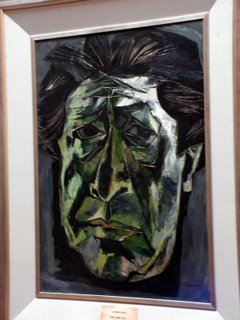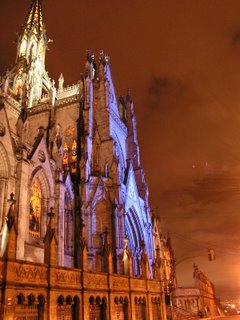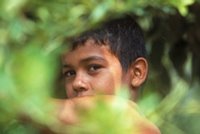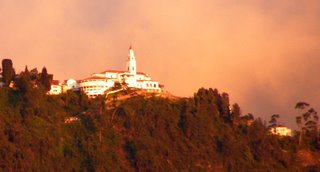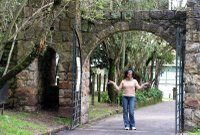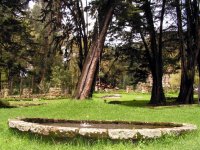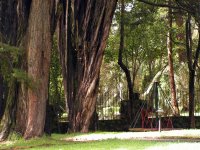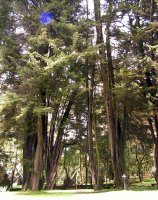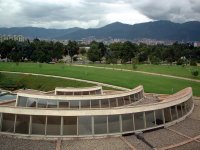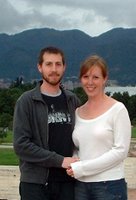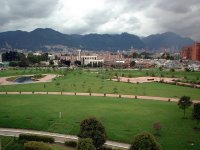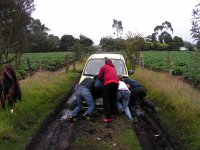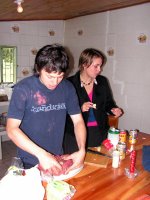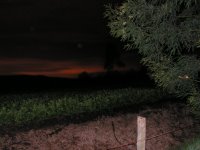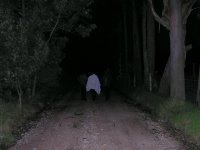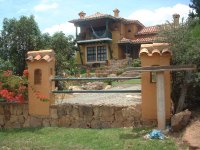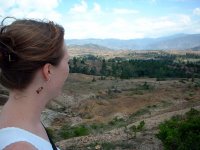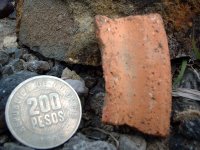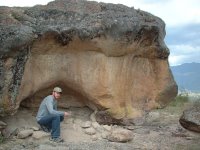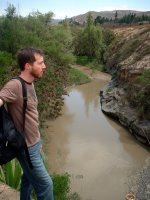Lately there have been days where it's hard to remember what I'm doing here. Somehow between getting to know the city, learning my way around the bakeries, then having to take up jogging again after patronizing every bakery within ten blocks (pretty direct correlation between these last two activities), making friends and attending classes, I'd lost sight of the idea that made me wade through the paperwork, herd professors into meetings, wheedle for recommendations, and revise my proposal 27,000 times. Somehow it all came to a head Tuesday. But a wise friend (thank you, Aimee) made me understand that periods of confusion and upheaval, though not perhaps enjoyable, are often necessary for growth. The time when the seed is still in the dark, damp earth is essential for the plant it will be to bear fruit.
Action helps. Wednesday and Thursday were productive days. Wednesday I worked out some details of my project - decided to focus in on who participates at a particular level - the Juntas Administratives Locales, which are local adminstrative boards that have control over a pot of money for community use. I want to look at who participates, what compells them to do so, and whether who participates (demographic-wise) has changed over time. I think these boards might be a good model for the direction Atlanta's Neighborhood Planning Unit system should take. As they exist today, the NPU's have very little power, and lots of paperwork. They also, not surprisingly, have an extremely low participation rate in most neighborhoods, although where the NPU is more powerful there is greater participation. I want to also compare this in Bogota - how does participation by the so-called "popular communities" that house most of the displaced population vary from the more properous localities?
(I need to find a synonym for participate.)
Thursday I met with the director of the Center for Social Studies (
Centro de Estudios Sociales) at the National University (UN). He's the friend of a Fulbright professor, and he offered me a role on a project the university proposed as part of a national competition for funding. The proposal examines various aspects of the construction of citizenship in modern Colombia, focusing on civic education, what citizenship means to traditionally excluded groups, and citizenship within the context of displaced communities that have been terrorized by violence -- it seems like a great fit.
(And maybe for citizenship too.)
He also asked me to help organize a series of encounters between Fulbright students and Colombian students at UN. So exciting!
Finally, he suggested I attend a conference on gender that was taking place on campus. I went, and I'm so glad I did. Among the speakers was
Maria Emma Wills, one of Colombia's foremost feminists and current director of the political science department at Los Andes. The woman sitting next to me, a teacher at a girls' school, got to talking about a project she wants to start with her students: a longitudinal take on what happens when girls are given feminist instruction from a young age. This sounds very 1970s to U.S. ears, I know, but in the Colombian context it's different. Here just showing up in a classroom full of girls and saying, I decided to finish my education before having kids is a minor relevation. At the same time, Colombia is a better place to be a strong woman than many other Latin American countries. Maria Emma said at one point in her talk, "Just because we're better off than women in many parts of the world doesn't mean we should be content with our lot."
I'm hoping to read at least part of her
dissertation while I'm here: Las trayectorias femeninas y feministas hacia lo público en Colombia (1970-2000) ¿Inclusión sin representación? [Feminine and feminist paths towards the public in Colombia (1970 -2000): Inclusion without representation?]
The aim of the dissertation is to understand the way Colombian women fought for their full citizenship in two public domains –the political and the academic—from 1970 till the year 2000, and how their claims were fought back or institutionalized in both spheres. The research starts from an analytical distinction between two dimensions comprised in full incorporation to public life: presence and representation.
Ah, there's the rub. Presence, yes, we can have that. But power? So far in world history, that's been another story entirely.


 Something Quito does have going for it is Oswaldo Guayasamin. I had seen one or two prints in friends' homes, but was not familiar with his work. The Capilla del Hombre was stunning and rather spiritually taxing. This man had a serious social conscience.
Something Quito does have going for it is Oswaldo Guayasamin. I had seen one or two prints in friends' homes, but was not familiar with his work. The Capilla del Hombre was stunning and rather spiritually taxing. This man had a serious social conscience.
 Monday, sessions all day, welcome dinner at the historic San Diego convent at night. Tuesday, sessions then a night tour of the historic center of Quito.
Monday, sessions all day, welcome dinner at the historic San Diego convent at night. Tuesday, sessions then a night tour of the historic center of Quito. Wednesday evening the sessions ended, and Thursday morning we left for Banos, town of hot springs and cascadas. Several ice cream stops later, we hiked to a waterfall full of power and grace, then set up at our (waterless) hostel, set high in the hills over Banos.
Wednesday evening the sessions ended, and Thursday morning we left for Banos, town of hot springs and cascadas. Several ice cream stops later, we hiked to a waterfall full of power and grace, then set up at our (waterless) hostel, set high in the hills over Banos.
 Friday was back to Quito, where we stayed in a hostel in gringolandia; Saturday and Sunday spent exploring the city with friends.
Friday was back to Quito, where we stayed in a hostel in gringolandia; Saturday and Sunday spent exploring the city with friends.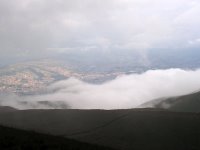 We took a cable car up a mountain called Pichincha overlooking the city, climbed to the top of the Basilica, went to a museum, and watched a little Equavolley (a hybrid version of volleyball in which people have been known to lose houses, cars, boats...), then caught the evening flight back to Bogota.
We took a cable car up a mountain called Pichincha overlooking the city, climbed to the top of the Basilica, went to a museum, and watched a little Equavolley (a hybrid version of volleyball in which people have been known to lose houses, cars, boats...), then caught the evening flight back to Bogota. It sounds funny to my ears, but it's good to be home. Who knew?
It sounds funny to my ears, but it's good to be home. Who knew?



